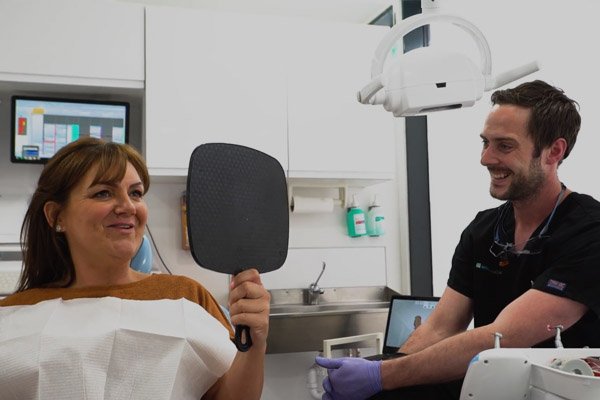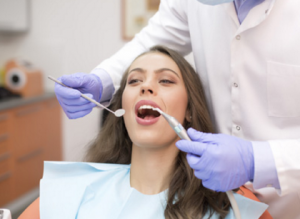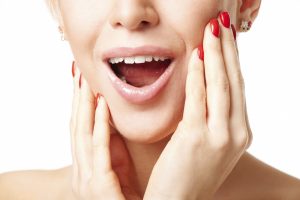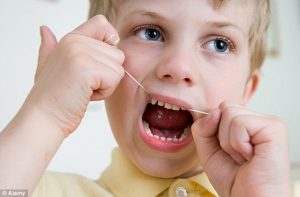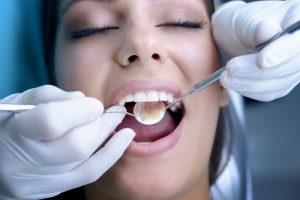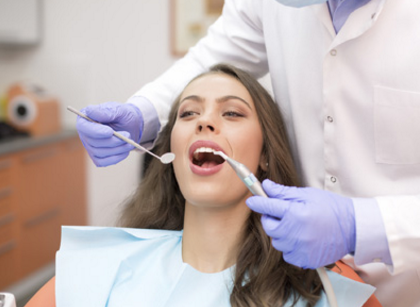Posts Tagged ‘dental health’
Signs You Should See Your Dentist
Monday, May 8th, 2017
Why Is It Important To See Your Dentist?
Regular dental check-ups are vital for maintaining the best oral health. Your smile is one of the first things anyone notices, and keeping it healthy and beautiful is important. Small aches and pains may not appear serious, but with time they can progress, leading to serious problems such as tooth decay and gum disease. So, when you notice something wrong with your teeth or gums, make sure to book an appointment at the Brite group as soon as possible.
Signs That Something May Be Wrong
Some of the most common signs of problems with your teeth or gums may be:
- Swollen or bleeding gums
- Teeth that are sensitive to hot or cold, or to sweet foods
- Pain or swelling around a tooth
- Wisdom teeth issues
- Jaw pain
- Loose fillings, crowns, bridges, or dentures
- You have an ongoing medical condition such as diabetes
- Changes to our life such as pregnancy or cancer treatment
Another reason to see your dentist may be more psychological than physical. The appearance of your teeth, such as their colour or if they are uneven or crooked, may make you feel unhappy with how you look. The Brite team is on-hand to offer a range of cosmetic treatments that can help you to feel confident again. These include teeth whitening, dental implants, invisible braces and many more.
Even if you don’t have any current issues, regular check-ups are still really important. If you visit as much as your dentist thinks is necessary (this can vary from person to person, depending on your oral health) they can spot any potential problems early on, and can offer treatment to stop tooth decay or gum disease from progressing.
What Could Happen If You Don’t See Your Dentist?
Tooth decay and gum disease can lead to serious issues if not treated. Without help from a dentist, these conditions will progress and worsen over time, until teeth become weak and loose. They may also cause you severe pain which can be eased with a dental visit. Acute conditions such as infections also need immediate treatment in order to keep your mouth in the best condition. Dental hygiene is important for staying in good health.
Keep Putting Off Your Visit? Don’t Worry, We Can Help
If you think you may have a cavity or a loose tooth filling, but you’re nervous about going to the dentist, don’t panic! Brite Dental has a friendly, qualified team that will help you to relax and make it through your appointment in a pain-free, calming environment. The Brite team will take time to evaluate your needs and will take into consideration the bigger picture, addressing any worries before treatment starts. Our experienced team will then put together an individualised treatment plan. So contact us today to book your next appointment.
Your Checklist For A Healthy Smile
Monday, June 13th, 2016
To help maintain a healthy mouth, Brite Dental have made a daily checklist with some handy tips.
1. Brush Your Teeth Twice A Day For 2 Minutes
Brushing your teeth twice a day, in the morning and before you go to bed, is absolutely vital for keeping them healthy. Not only does brushing eliminate food particles and plaque from the mouth, but it prevents gum disease, tooth decay and bad breath. The recommended time of 2 minutes helps ensure that you are not rushing through the process and that all the teeth are clean. Always use gentle back and forth motion across your teeth and gum line when brushing.
2. Brush At Least 30 Minutes After Eating
After consuming acidic or sugary foods you should wait at least 30 minutes before brushing your teeth as this allows enough time for your saliva to neutralise the food acids. Theses acids are found in most foods and can be harmful to your tooth enamel as the acid contained in the food temporarily softens the enamel as these foods interact with the plaque in the mouth. Brushing directly after the consumption of such foods will cause further damage to the teeth surface. Don’t neglect your tongue! brushing your tongue helps remove plaque and bacteria that sticks to the surface which in turn can help fight bad breath.
3. Floss Once A Day
Many people forget this one! Flossing your teeth makes all the difference, it helps get rid of food particles that get stuck between your teeth that you cannot reach when brushing. It plays an important role in helping maintain good oral hygiene and preventing gum disease. Care must be taken when flossing to avoid irritating your gums which can often result in bleeding. Just ask at your local Brite, we would be more than happy to demonstrate how you can floss effectively.
4. Rinse With Antibacterial Mouthwash
Rinsing your mouth with antibacterial mouthwash after brushing is strongly recommended. Not only does it help remove plague and refresh your breath but can also help prevent tooth decay and gum disease.
5. Chew Sugarless Gum
Brushing your teeth after every meal is not very practical, plus over brushing can damage your enamel. So we advise chewing sugarless gum after eating. This will help to keep your breath smelling fresh but chewing also encourages the production of saliva which acts as a natural defence against acid. This also washes away food particles, helping to keep your teeth clean.
6. Limit Your Intake Of Sugary Foods And Beverages
We all enjoy indulging in sugary snacks every now and again, however consuming these too often can affect the whiteness of your smile and the freshness of your breath. What’s more of a concern is a poor diet can also lead to tooth decay and gum disease. This is due to the sugar reacting to bacteria in the plaque (the sticky layer on your teeth) and producing harmful acids. These acids then attack the teeth and destroy the enamel which can result in a cavity or hole forming.
Schedule Your Next Dental Appointment At Brite Dental
Incorporating these things into your daily routine will help you maintain a healthy smile. You should also remember to replace your toothbrush regularly. This should be done every 3 to 4 months or when the bristles start to look worn. Don’t forget to visit your dentist regularly; frequent check-ups are essential, so why not contact us and book your next appointment at Brite Dental?
What To Do in a Dental Emergency
Monday, June 22nd, 2015
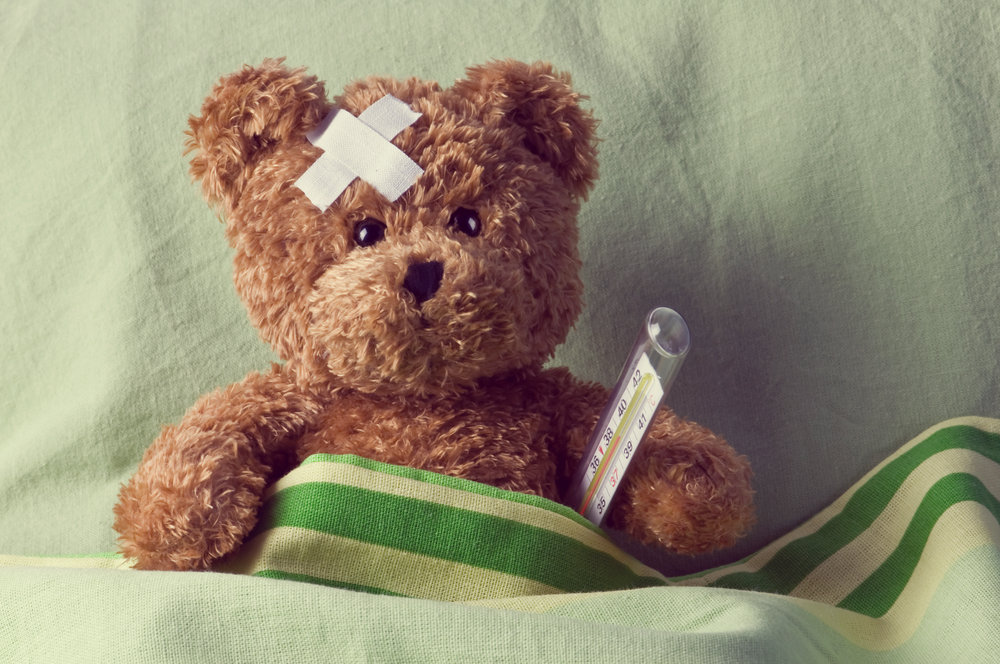
Tooth enamel is the strongest substance in the human body, however, it is not completely invincible. Through bad oral hygiene, accidental damage or hard foods, tooth enamel can become chipped, cracked, or in worse case scenarios, the tooth can be completely knocked out.
Enamel has no living cells so the body is unable to repair chipped or cracked teeth itself. This is why it is important that if you or someone in your family experiences a dental emergency you follow the right precautions in order to cause the least amount of damage and stress.
In this short blog on dental emergencies, we’ll answer the question of “what is a dental emergency” as well as listing some of the most common dental emergencies you may experience and how you should cope with them if they ever arise.
What is a Dental Emergency?
A dental emergency involves severe dental trauma or pain. Common examples of a dental emergency are:
- A tooth being knocked out or dislodged
- A tooth being cracked or chipped
- Excessive bleeding in the gums and mouth
- Severe toothache
- Abscesses or swellings which cause severe pain and discomfort
Please remember that it’s critical for a dental emergency to be addressed as soon as possible in order to prevent long-term damage and more severe trauma from developing.
For patients experiencing a dental emergency, you can contact one of our surgeries directly or phone NHS 111 if the emergency happens out of hours.
Severe Toothache
Toothache is the pain you can experience in and around your jaw and teeth. Toothache can feel different and ranges from constant dull pain to shooting, more intense pain. It can also be caused by a number of different reasons, including sensitivity, tooth decay and gum disease.
If your toothache has lasted more than one or two days then you should make an emergency appointment to visit your dentist to have it checked and to find out its cause.
If your toothache is caused by dental decay and you leave it untreated then your tooth will become infected, leading to severe pain and in some cases, you will require root canal treatment to save the tooth from extraction.
To aid your toothache whilst you wait to see the dentist you can take painkillers, such as ibuprofen and paracetamol. You can also hold a cold compress to the outside of your cheek. You should not hold anything cold directly on your tooth as this can make the pain worse.
Chipped or Broken Tooth
If you have chipped a part of your tooth and have managed to recover it, you should store the fragment in a clean container filled with your saliva or milk until you are able to visit a dentist.
Your dentist may be able to reattach the fragment back onto your tooth. You should also make sure to rinse your mouth out with warm water and apply pressure with a piece of gauze to the area if your mouth is bleeding.
If your dentist is unable to reattach your own tooth, they will replace it with a filling or crown depending on which tooth it is that is chipped. If the chip has occurred and broken half way down your tooth then you may have damaged the nerves. These instances can become very serious as damaged pulp can become infected.
Knocked Out or Dislodged Tooth
If your tooth has been completely knocked out it is very important that you treat it with care – only handling it by the crown (white part at the top) and avoid touching the tooth’s root. If the tooth is dirty, you should avoid brushing or scraping it and instead rinse it with milk or saline (salt water) – not water or alcohol.
You should attempt to put the tooth back in the socket as soon as possible and once it is in place bite down on a clean piece of fabric such as a handkerchief to keep it in place.
If you are unable to place the tooth back in its socket you should keep it in a clean container filled with either your own saliva or milk until you are able to visit a dentist. Like a chipped tooth, you should also make sure to rinse your mouth out with warm water and apply pressure with a piece of gauze to the area if your mouth is bleeding.
This advice is only for adult teeth. If your child’s baby tooth falls out, you should not try and reinsert it as their adult teeth will grow in as a replacement.
What Else Could Your Bad Breath Mean?
Wednesday, June 17th, 2015
 Halitosis, commonly known as bad breath, can be an embarrassing problem. But did you know that bad breath can also be a sign of other health problems?
Halitosis, commonly known as bad breath, can be an embarrassing problem. But did you know that bad breath can also be a sign of other health problems?
What Causes Bad Breath?
Bad breath has a number of causes, the most common being poor oral and dental hygiene. If you have a poor dental routine then bacteria will build up in your mouth which can result in plaque, tooth decay and gum disease. Brushing your teeth, flossing and cleaning your tongue will help you to remove these bacteria.
Bad breath may also be caused by your habits. Smoking and consuming strongly flavoured foods and drinks such as garlic, alcohol and coffee may cause bad breath. This type of bad breath is generally temporary and can be remedied with good dental care and regularly visiting your dentist.
You may also experience bad breath as a result of crash dieting. Dramatically altering the foods you consume, either by through a low-carbohydrate diet or fasting causes your body to break down fat, producing chemicals called ketones which smell.
What are the Health Problems Associated with Bad Breath?
Bad breath is an embarrassing problem to have but did you know that it could also be a sign of other health issues? Halitosis has been found to be a sign of a number of health problems including: stomach cancer, lung cancer, kidney failure, diabetes and gum disease. Your mouth is a gateway to the rest of your body and any problems you are experiencing there may be an indication of a more serious problem. If you have noticed any change in your oral health you should make an appointment to visit your dentist who will be able to advise you.
What Can You Do To Prevent Bad Breath?
You can prevent or reduce your bad breath by following a number of steps:
- Visit your dentist regularly. Not only will they be able to determine the cause of your bad breath but they will also be able to provide tips and techniques to help.
- Practice good dental hygiene including brushing your teeth twice a day and flossing. This will help you to remove bacteria in your mouth.
- Stop smoking.
- Drink water and chew on (sugarless) gum.
- Eat snacks with a high water content such as cucumber, celery and carrots.
- Drink water. Dry mouth (xerostomia) has an effect on the flow of saliva into your mouth which can cause a build-up of bacteria, leading to bad breath. By drinking water you can help to keep your mouth moist and prevent bad breath.
Dental Care at Brite Dental?
If you are concerned about your dental health the contact the Brite Dental team. Our clinical care team is here to look after you and your dental health needs. We have practices in four locations and offer both NHS and cosmetic dentistry treatments.
Why is Oral Hygiene Important?
Friday, November 28th, 2014
Proper oral hygiene is essential for living a healthy and happy life. If you neglect your teeth and oral hygiene, it’s likely that you’ll experience levels of pain, discomfort that will have a significant impact on your daily life and mental well-being.
In addition, having missing, damaged or cracked teeth can negatively impact our self-confidence and mental well-being, highlighting that oral hygiene is extremely important if we want to create a happy, care-free lifestyle.
This article looks further into the question of why oral hygiene is important, giving helpful advice, tips and tricks on how to improve your oral hygiene and look after your teeth so they remain in great condition for many years to come.
How to improve your oral hygiene?
If you would like to have beautiful and healthy teeth throughout your life, we would recommend visiting your dentist every 6 months for a check-up and having your teeth scaled and polished by a professional dental hygienist.
Another thing that will help keep your smile healthy is reducing your consumption of sugary, salty and acidy foods and drinks. Improving your diet and keeping sugary treats to a minimum (I.e. only once after dinner time) can vastly improve your oral health.
As a dental clinic, we want you to have the best possible oral health, so here are some more helpful tips to help you improve your oral hygiene:
- Brush twice a day: Brushing your teeth twice a day is crucial for removing food particles and plaque that can lead to tooth decay and gum disease. Use a soft-bristled toothbrush and fluoride toothpaste to thoroughly clean all surfaces of your teeth.
- Floss daily: Flossing helps remove plaque and food particles from between your teeth, where your toothbrush can’t reach. It’s best to floss before you brush your teeth to help dislodge any debris that might have been caught between your teeth.
- Use mouthwash: Mouthwash can help kill bacteria and freshen your breath. Look for one that is alcohol-free and contains fluoride.
- Schedule regular dental check-ups: Regular dental check-ups and cleanings can help catch any potential issues early, before they become more serious.
- Consider adult orthodontic treatment: If you have crooked or crowded teeth, orthodontic treatment can help straighten your smile and improve your overall oral health.
Remember, good oral hygiene habits are essential for maintaining a healthy smile. If you have any questions or concerns, don’t hesitate to contact our dental clinic for further advice and guidance.
The importance of having strong, healthy teeth
We’re told from a young age that we need to brush our teeth regularly and look after our teeth properly, but why are teeth so important?
You may think you know the answer; Without healthy teeth, we cannot chew and eat the foods that we love. However, whilst this is certainly one reason why teeth are important, it isn’t the only answer!
Teeth also play a vital role in many other areas, including speech, facial structure and our physical appearance. In addition, without a healthy, attractive smile our self-confidence may suffer and our mental well-being can take a hit.
There are several reasons why teeth are important, including:
- Chewing: Teeth play a crucial role in chewing and breaking down food into smaller pieces, which makes it easier for our bodies to digest.
- Speech: Without a full set of teeth, it can be difficult to form words and sounds properly.
- Appearance: Teeth are a prominent facial feature and can significantly impact our overall appearance and self-confidence.
- Supporting facial structure: Teeth help support our facial structure and prevent our cheeks and lips from collapsing.
- Protecting gums and jawbone: Teeth provide protection for our gums and jawbone by evenly distributing the force of our bite and preventing damage from occuring.
- Maintaining overall health: Good oral health is linked to overall health, so by keeping our teeth healthy and clean, we can actually help prevent serious health conditions like heart disease, diabetes, and stroke.
- Digestive health: Teeth play a critical role in the digestive process, as they help break down food so that it can be absorbed and used by our bodies.
- Preventing tooth decay and gum disease: Regular brushing and flossing can help prevent tooth decay and gum disease, which can cause pain, discomfort, and potentially lead to tooth loss.
As we can see, keeping on top of our oral health and ensuring our teeth are clean, healthy and happy will have a positive impact on our overall well-being.
Not only will healthy teeth help us maintain a good level of physical health but they will also improve our appearance and with it, ensure a good level of self-confidence and mental well-being.
Top tips for Looking after your teeth correctly
It is vital to get into a regular habit of cleaning your teeth if you wish to maintain a good level of oral hygiene. We recommend brushing your teeth at least twice a day for 2 minutes at a time.
Whilst you don’t need to buy expensive toothpaste to make your teeth healthy, you do need to make sure that your toothpaste has fluoride in it. Regularly change your toothbrush every 3 to 4 months. If you use an electric toothbrush. change the heads at the same rate. Make sure to brush either before or an hour after eating or drinking acidy drinks such as juice or wine in order to prevent teeth erosion.
We also strongly recommend flossing regularly, as brushing on its own will not fully clean the teeth and gums. Without flossing, plaque buildup or stray food particles will be left between teeth.
Some additional tips for looking after your teeth include:
- Eat a healthy diet
- Don’t smoke or use tobacco
- Consider getting dental sealants
- Be mindful of teeth grinding
- Visit your dentist regularly
The last point is one we cannot stress enough. Even with a great level of oral hygiene, serious issues can still be missed if you neglect visiting a professional dental clinic.
Having a dental check-up every 6 months will allow your dentist to spot any emerging issues and deal with them before they turn into a serious problem. If you find that cosmetic dentistry treatments are needed, remember we offer a fantastic dental finance plan that helps make necessary treatments more affordable.
Why not get ahead of the game and book your next dental checkup today via the Brite Dental website?
That way, you can relax knowing that your teeth will be checked, monitored and evaluated by a professional, giving you peace of mind that any pesky issues will be dealt with quickly, efficiently and effectively.
Book or join the practice the Brite Dental practice that suits you best and take a step towards a happier, healthier smile.

